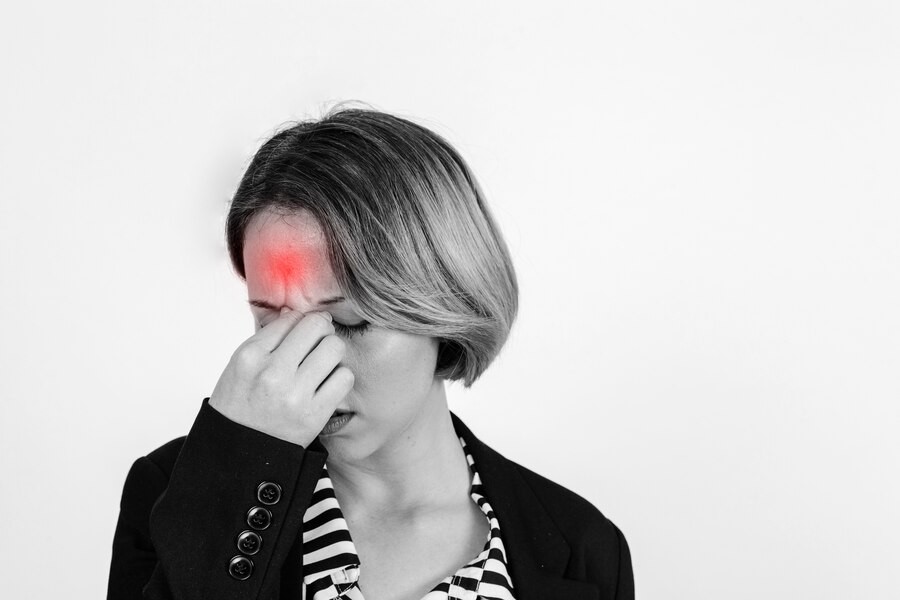Sakit kepala migrain adalah salah satu jenis sakit kepala yang sangat mengganggu aktivitas sehari-hari. Rasa sakitnya diarasakan pada salah satu sisi kepala yang bisa berlangsunng selama berjam-jam hingga berhari-hari.
Selain rasa nyeri di kepala, migrain juga disertai gejala lain seperti mual, muntah, serta sensitivitas terhadap cahaya dan suara. Beberapa orang juga mengalami gangguan penglihatan yang dikenal sebagai aura, yang bisa berupa kilatan cahaya, bintik-bintik, atau kehilangan penglihatan sementara. Adakah cara mencegah sakit kepala yang mengganggu ini?
Cara Mencegah Sakit Kepala Migrain
Tidak ada obat yang ampuh dalam menyembuhkan migrain secara total. Pengobatan yang diberikan biasanya hanya untuk meredakan gejalanya saja.
Namun seperti pepatah, lebih baik mencegah daripada mengobati, Anda perlu tahu bagaimana cara mencegah sakit kepala migrain agar tidak sering kambuh.
Mengenali pemicu migrain
Langkah terpenting dalam mencegah migrain adalah mengenali apa pemicunya. Setiap orang memiliki pemicu migrain yang berbeda-beda. Beberapa pemicu umum di antaranya:
- Makanan atau minuman yang mengandung cokelat, kafein, makanan ber-MSG, serta minuman beralkohol
- Stres emosional dan fisik
- Perubahan pola tidur
- Perubahan hormonal saat menstruasi, kehamilan, atau menopause
Dengan mengenali pemicu sakit kepala migrain, Anda bisa mengindentifikasi pola dan menghindarinya di masa mendatang.
Baca Juga: Migrain saat Cuaca Panas, Begini Mengatasinya
Menjalani pola hidup sehat
Pola hidup sehat tidak hanya baik untuk kesehatan secara keseluruhan, tetapi juga bisa membantu mencegah migrain. Usahakan tidur dan bangun pada waktu yang sama setiap hari, bahkan di akhir pekan. Tidur yang cukup dapat membantu menstabilkan ritme sirkadian dan mencegah migrain.
Aktivitas fisik rutin seperti berjalan kaki, bersepeda, atau berenang dapat membantu mengurangi frekuensi migrain. Namun, pastikan Anda tidak melakukan olahraga terlalu intens agar tubuh tidak kelelahan dan justru memicu migrain.
Pilihlah makanan yang mengandung gizi seimbang dan hindari makanan yang memicu migrain. Mengatur pola makan juga sangat penting untuk mencegah berkembangnya penyakit kronis lainnya.
Mengelola stres dengan baik
Stres adalah salah satu pemicu migrain yang paling umum. Mengelola stres dengan baik dapat menjadi kunci untuk mencegah kambuhnya migrain. Anda bisa mencoba beberapa teknik relaksasi seperti meditasi, yoga, teknik pernapasan dalam, atau melakukan hobi yang menghibur.
Baca Juga: Pantangan Makanan saat Mengalami Migrain
Mempertimbangkan pengobatan preventif
Apabila migrain cukup sering kambuh dan mengganggu, ada baiknya berkonsultasi dengan dokter mengenai pengobatan preventif. Obat-obatan seperti beta-blockers, antidepresan (obat untuk mengatasi depresi), dan antikonvulsan (obat untuk kejang) kadang-kadang diresepkan untuk membantu mengurangi frekuensi dan keparahan migrain.
Pengobatan preventif biasanya diberikan setiap hari dan membutuhkan beberapa minggu atau bulan agar efektif. Pemilihan obat tergantung pada banyak faktor, termasuk kondisi kesehatan secara umum, riwayat kesehatan, dan interaksi dengan obat lain yang dikonsumsi.
Konsultasikan dengan dokter untuk menentukan pengobatan dan cara mencegah migrain yang paling efektif untuk diri Anda. Anda juga bisa memanfaatkan layanan konsultasi kesehatan Ai Care dengan mengunduhnya melalui App Store atau Play Store.
Mau tahu informasi seputar penyakit lainnya? Cek di sini, ya!
- dr Nadia Opmalina
Mark Gurarie (2024). How To Prevent a Migraine. Available from: https://www.health.com/migraine-prevention-7094820
Cleveland Clinic (2024). Migraine Headaches. Available from: https://my.clevelandclinic.org/health/diseases/5005-migraine-headaches
Mayo Clinic (2023). Migraine. Available from: https://www.mayoclinic.org/diseases-conditions/migraine-headache/symptoms-causes/syc-20360201
Jay Summer (2023). Migraines and Sleep: A Bidirectional Relationship. Available from: https://www.sleepfoundation.org/physical-health/migraines-sleep
Lauren Ragland (2023). Ways to Manage Stress. Available from: https://www.webmd.com/balance/stress-management/stress-management
WebMD (2023). Ways to Prevent Migraine Headaches. Available from: https://www.webmd.com/migraines-headaches/preventive-migraine-medicine











